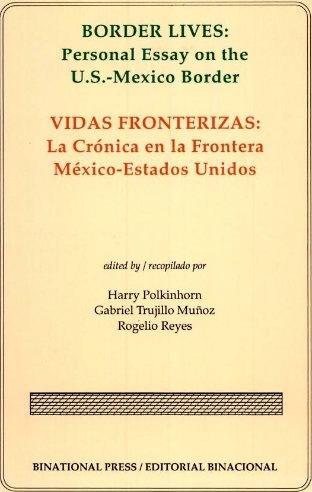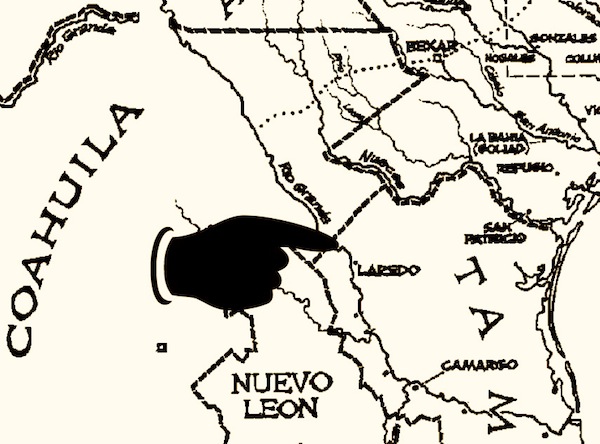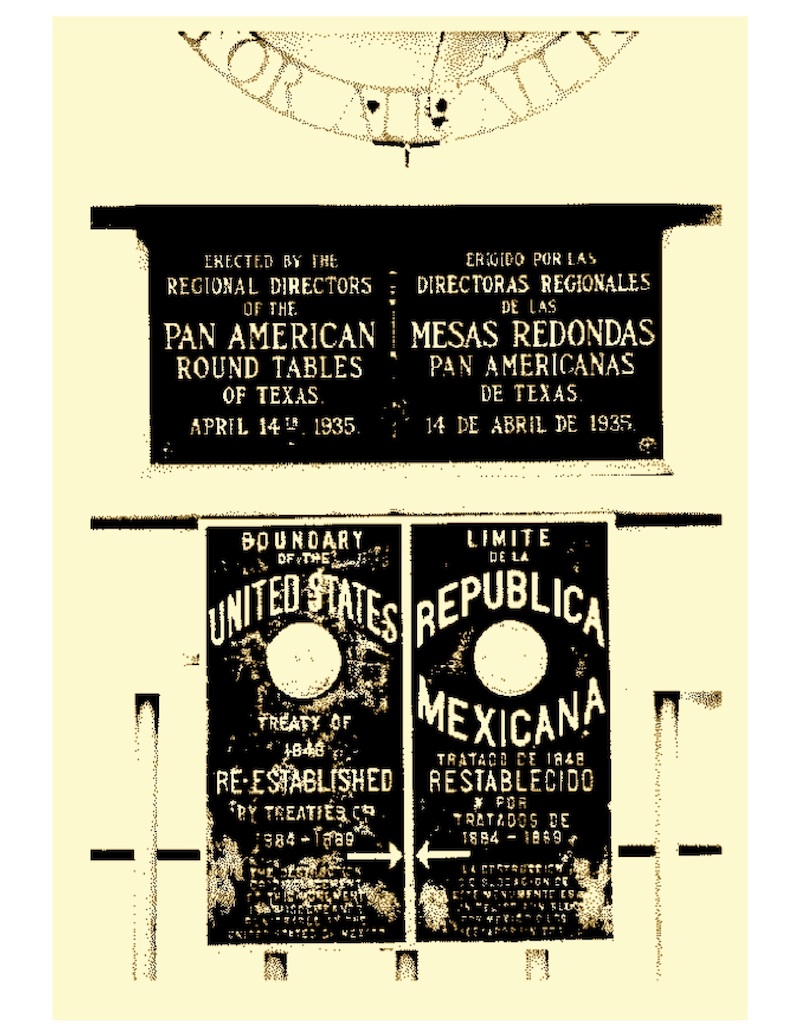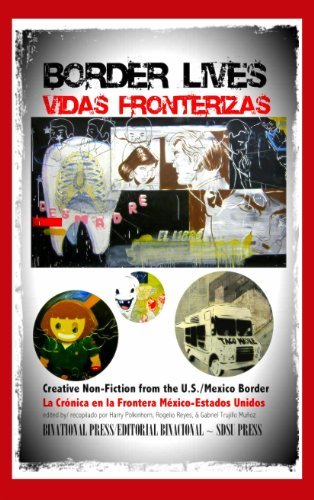 From
Border
Lives: Personal Essay on the U.S.-Mexico Border From
Border
Lives: Personal Essay on the U.S.-Mexico Border
Harry Polkinhorn, et al., eds. (translated by Tomàs Di Bella and Harry Polkinhorn), 1995, Trade paperback: 680 pages; illustrated, ISBN 968-7326-19-0; $25 plus shipping/handling | On sale now via Amazon.com! More images from this book appear here. 'She
lacerates herself with memory.'
"Remembering" ¿What Is Truth At The Border? {i} I love the word "remember" as much as I like remembering. And I love "remember" as much as for what it means as for the way it masks certain ravaging, destructive processes essential to the dynamic of memory. In essence, the only reason you have to remember 'something' is that you have dismembered or forgotten it. {ii} Dismember: to take apart. The word most often appears in lurid crime reports or, not coincidentally, in business press accounts of corporate "progress." Murdered bodies and dismantled small businesses are the objects of dismemberment. They are, also, sometimes hard to remember. {iii} Memory embodies a destructive and creative process driven by desire. Therein rests its complexity as well as our necessity for describing its processes. {iv} I must remember. I have no choice. And as I have no choice, no way of short-circuiting the desires of my unruly unconscious, I fall to reason and to rhetoric to somehow master--if only temporarily--the inchoate, sensual intrigues of memory. {v} And it is the border I remember most. The border I could not completely dismember and will never leave. {vi} I was born in Laredo Texas in 1961 and there I stayed until the Fall of 1980 when my father almost died the week before I left for Austin and the University of Texas. My father survived, barely as did I. Those chaotic weeks were a prelude to eleven years of exile as I moved from the University of Texas in Central Texas to Cornell University in Upstate New York to the ugly, bowels of Eastern Connecticut and The University of Connecticut at Storrs where I endured my first posting as an Assistant Professor of English and Comparative Literature. The romance of snowy Ithaca gave way to the bucolic excess of a New England land grant university. {vii} I nearly lost my mind. Better put, I changed--was altered. The odd alien symmetry of this other space which was not the border, left strange, ciphered tattoos on the flesh of my soul. They cannot be removed. I now subject the three years I lived and worked in Connecticut to daily doses of dismembering. I remain somewhat hopeful that Memory itself will not recall the need to return me to those distant snow drifts, those disturbing days of ice and fracture. {viii} In 1991 I returned to the border, or at least a kind of border, San Diego, California and San Diego State University. I write "a kind of border" because San Diego was not Laredo. I was a self-exiled Tejano in a distinctly Chicano/a landscape. This was new. I had only come to an understanding of the status of the "American of Mexican descent" in US mass culture at Cornell where I was one of several dozen examples of said category. At Cornell, of all places, I became Chicano. {ix}
{x} Laredo is the "Gateway to Mexico," the largest inland port in the continental United States--I have appended the "Gateway to Mexico" slogan/moniker here because of its relative value: to Laredo more than to myself. (The city recently sued the City of San Antonio over ownership of the phrase "Gateway to Mexico." The City of Laredo won, a tidbit of no little value for our ongoing exchange). {xi} Laredo is of no little value either because of its unique, homogeneous population.1 Over 90% percent Texas Mexican, Laredo's citizens suffer little if any from the scourge of mexicanicity common in Boulder, Los Angeles, San Diego or Dallas. The bad and the good, the ugly and the beautiful, all or most are United States citizens of Mexican descent. Laredo's criminals are for the most part Texas Mexican as are its police and the judges; as is the case elsewhere, a fair portion of the judges and police are criminals also. It is not that national origin does not figure in the estimation of one's value vis-a-vis the community in Laredo, only that class, one's monetary lineage as it were, is, in the final analysis what makes the difference between the elite and the downtrodden in Laredo. I will have appeared to have forgotten ethnicity--it's not that I have forgotten but that I have left it here for the end of the paragraph. Laredoans are like the bulk of Mexicans in this regard, the lighter the skin, the better. The less "indio" one is, the more choice one has. But there are exceptions. Laredo is a city that lives and dies on trade. And a healthy import/export business can often mask (temporarily perhaps) the "stain" of an indigenous-heavy mestizo ancestry. {xii} Speaking of the status of the "indio," it merits disclosure that my father's mother's father's father, Francisco Juarez (no relation to Benito that I know of), was kidnapped before 1850 from his home by a nomadic troupe of Comanche scouts. He escaped two years later. And it is a good thing too, lest these words never appear . He was glad to escape also, from what I can gather. Not surprisingly, I feel the same way. {xiii} As I said above, I left Laredo and eventually ended up in San Diego. San Diego was different, better than the stoic wastelands of Eastern Connecticut but still not the border of memory, not Laredo. San Diego's Chicano/as, Hispanics and Latinos/as constituted a peculiar sub-altern population, filled with alliances, conflicts, cliques and covens--they all had something in common though. Attitudes about Mexicans held by Anglo Californians who outnumbered them helped define Chicano/a attitudes towards themselves and those who fenced them in, who disturbed them. Laredo is an oasis of Mexicanicity in the United States of America--San Diego, at times, was more violent, more vulgar. San Diego more truly disclosed those seething racial antipathies which in an odd way suture that nation still called the United States. {xiv} What makes one an American used to be our shared enemies. Now with the Soviet Union itself dismembered, scattered about the dustbin of history, Wal-Mart and Cable Television filled the void, telling us who we are, who to touch, who to hate and (always) what was wrong with our bodies. In the process, our minds were well policed as well. One is not likely to learn an appreciation for cultural difference in the aisle of a shopping center or, for that matter, from a television. {xv} San Diego and Laredo were different, the Southland and South Texas worlds away from each other. What I knew to be true at one site was patently false in the other. And you cannot imagine how hard it is for me to write the sentence previous about "kn[owing and] tru[th]". I am no fan of ideal concepts. In a world filled with mutating representations, a world awash in the sordid intrigue of metaphor and metonymy, I am as likely to believe in truth as I am to caress the tiles of the altar of progress. {xvi} In the book now beside my bed there appear words which speak to my view: "I have no problem with people who espouse ideals; I merely pull on gloves in their presence." The speaker is none other than the redoubtable Frederico Nietzsche, the text Ecce Homo. Nietzsche's clever adaptation of the trope of hygiene (his pathological fetish for worlds both clean and dirty) captures the essence of my attitude towards the lure of Truth. Truth is a contaminant. Where faith in Truth appears, infections soon follow. Someone ends up getting hurt. Usually permanently. {xviii}
[END OF SELECTION]
|


